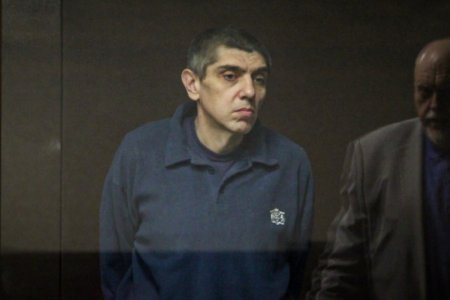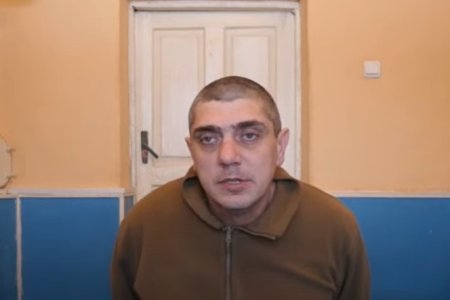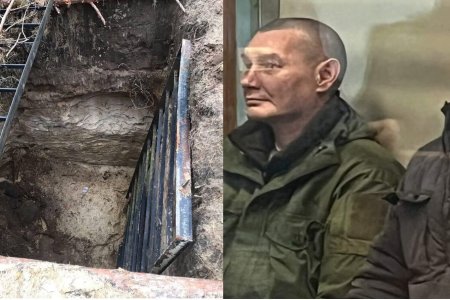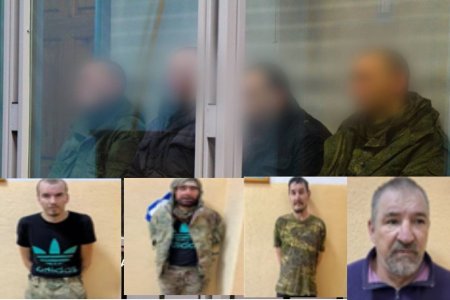
A court in Russia has ignored international law; an absurd indictment and indications of torture and sentenced Ukrainian prisoner of war Anton Cherednyk to 19 years’ harsh regime imprisonment, with the first three years in a prison, the harshest of Russia’s penal institutions. The Southern District Military Court in Rostov has been notorious since 2014 for churning out sentences against Ukrainian political prisoners and was probably obeying orders ‘from above’ when it passed a sentence on Cherednyk which was two years longer than that demanded by the prosecutor.
Russia has long flouted international law by staging ‘trials’ and massive ‘sentences’ against Ukrainian political prisoners, but the majority have been hidden in its proxy ‘Donetsk and Luhansk people’s republics’ [‘DPR’/’LPR’]. The ‘sentences’ in the latter cases are passed by unrecognized ‘courts’ without any respect for rule of law and in the absence of independent media and international observers. The fact that Moscow chose to hold Cherednyk’s ‘trial’ in a Russian court is effective confirmation that the charges in all those ‘trials’ on occupied territory are pure fabrication, with the videoed ‘confessions’ obtained through torture and without any access to an independent lawyer. Cherednyk’s case differs in one respect, namely that there was a civilian, Oleksandr Piskunov, whom Cherednyk does not deny having shot and killed. There is nothing to suggest that the Russian prosecutor proved that this was a killing in cold blood and not, as Cherednyk maintains, because Piskunov made a sudden move, and he had no way of knowing that the man was unarmed. The additional, truly surreal, charges that Russia laid, as well as the preposterous claims made as to why Cherednyk opened fire, are much more reminiscent of the politically motivated ‘trials’ that Russia and its proxy ‘republics’ have been staging since 2014.
Cherednyk was prevented from having an independent lawyer and was represented throughout by a state-appointed lawyer, Vladimir Bakulov. The latter confirmed after the verdict was announced on 8 November that Cherednyk would be lodging an appeal. Until then he will remain imprisoned in a Rostov SIZO [remand prison].
44-year-old Cherednyk is a professional marine, with the rank of senior lieutenant in Ukraine’s Armed Forces. His 501st Marine Battalion was stationed in Berdiansk at the beginning of Russia’s full-scale invasion and was sent to the outskirts of Mariupol which Russia was relentlessly bombing and shelling. His part of the Battalion was deployed at the urban settlement Myrne and it was there in March 2022 that some of the marines ended up in Russian captivity (in circumstances that remain unclear).
According to the indictment, Cherednyk was taken prisoner on 4 April 2022, with his ‘trial’ in Rostov beginning a year later, to the very day. Most of the charges are in flagrant violation of the Third Geneva Convention as they pertain solely to Cherednyk’s actions as a member of Ukraine’s Armed Forces. He was accused of ‘planning an armed seizure of power’ (Article 278); ‘undergoing training for the purpose of carrying out terrorist activities’ (Article 205.3). ill-treatment of the civilian population (Article 356 § 1); and murder (Article 105 § 2).
The first two charges border on the insane, with the indictment calling Mariupol “territory of the independent state with its centre in Donetsk which was temporarily occupied by Ukraine”. Russia is claiming that a Ukrainian serviceman defending his country was ‘planning violent seizure of power’ with this ‘independent state’ one that Russia itself only ‘recognized’ on the eve of its full-scale invasion and which is not recognized by any democratic state.
Nor do all of the charges even pertain to the period after Russia’s full-scale invasion, with the court in its verdict noting that Cherednyk had trained as a ‘machine gunner’ in March 2016, signed a contract with Ukraine’s Armed Forces, and been “sent to DPR at the beginning of 2017”.
It was claimed that, on 27 March 2022, Cherednyk was patrolling Myrne, together with Anton Baidrakov, and stopped two local residents, Oleksandr Piskunov and Serhiy Potseluyev. He allegedly fired into the air and ordered the two men to lie on the ground. According to the indictment, Cherednyk searched the two local residents and then began questioning them. He supposedly demanded that Piskunov pronounce the ‘word «паляниця» [‘palianytsia’]. This refers to a type of bread but has become a kind of code word for distinguishing Ukrainians from Russians, since the latter cannot pronounce the word correctly. Had Cherednyk genuinely asked the two men to pronounce the word, this would have been because he suspected them of being Russians which would mean that they were hardly civilians strolling about a village in Ukraine.
The prosecution’s material claimed that, two days after Cherednyk was detained, he had ‘confessed’ to having killed Piskunov. On this so-called ‘confession’, which was broadcast on the Russian state-controlled ‘Russia Today’ channel on 9 April 2022, it is clear that Cherednyk is in a terrible state, seems unable to think clearly and can scarcely articulate words. He says that he told “two guys” to stop. They had initially not obeyed, but did then stop, and he told the first one to [inarticulate] palanytsia. “He didn’t answer me. I shot him. The second [said] palanytsia is bread, and I let him go. “ He does not say anything about the men being on the ground. During the ‘trial’, a forensic scientist said it was unclear whether Piskunov had been lying or standing but did conclude that the shot was in the back.
Earlier Russian reports claimed that Piskunov had not pronounced ‘palanytsia’ correctly, and that Cherednyk had then shot him. If so, then Cherednyk was too battered during his supposed ‘confession’ to get his lines right. It is certainly more usual to use this word to detect Russian mispronunciation, rather than as a test of whether somebody knows what it is. Such a focus on language, and on a word which numerous videos have shown even young children using with delight when greeting Ukrainian forces liberating their villages or towns, would suit Russian propaganda.
Had this absurd charge really been true, then Cherednyk would hardly have let the second civilian escape purely because he knew what the word meant.
There are three people with victim status in the case: Potseluyev, and Piskunov’s mother and grandmother. It is claimed that there are also witnesses to the shooting (who did not hear what was said) as well as Anton Baidrakov, the Ukrainian serviceman with Cherednyk. Baidrakov is imprisoned in occupied Donetsk and has also been prevented from seeing an independent lawyer or relatives.
There is no information as to how the criminal case was initiated, nor as to how the alleged witnesses and Piskunov’s grave were found.
The Southern District Military Court has on numerous occasions ignored statements from Ukrainian political prisoners retracting ‘confessions’ given under torture, despite the evidence that the retractions were given as soon as the prisoners were finally allowed to see independent lawyers. In this case, Cherednyk was never allowed a lawyer of his choice, or contact with his family, and three propaganda videos with Cherednyk’s interrogation and ‘confessions’ were treated as evidence.
The independent publication Graty tracked down another video on which Cherednyk looks in much better condition. There he also says he shot Piskunov, but there are some crucial differences. He makes it clear that he thought the two men might be Russian soldiers and therefore asked them to pronounce ‘palanytsia’. He says that one of the men ran away; that Piskunov answered his questions and that he shot him not because of the word, which he repeated correctly after Cherednyk, but because he made a sharp move. At that point, the video suddenly stops. Cherednyk was clearly not saying what his captors wanted and that video was not presented as evidence, although it was clearly Cherednyk speaking and shed light on the events.
Cherednyk repeated the vital details in court where he rejected almost all of the charges. While acknowledging that he had killed Piskunov, he insisted that he had shot at the man because he was behaving in a suspicious manner and because he made a sharp move as though trying to get out a weapon. He denied having demanded any Ukrainian words and said that this had been needed by the prosecution in order to falsify the charges, to claim that Cherednyk had been motivated by ethnic hatred.



